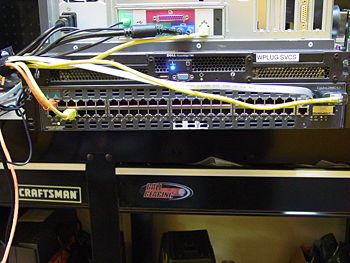Installfest Services: Difference between revisions
(Conetnt ~BAS) |
(Note that I'm about to rewrite this page) |
||
| Line 1: | Line 1: | ||
== DEPRECIATED == |
|||
| ⚫ | |||
NOTE: The content on this page is depreciated. The content will be updated on the weekend of 2/17/2012 to reflect current status. |
|||
| ⚫ | |||
The service runs on local hardware in the LAN. Having local install/update mirrors avoids the need for [[WPLUG]] attendees to consume Commodity Internet (commercial upstream Internet Connectivity) at the [[InstallFest]] venue. |
The service runs on local hardware in the LAN. Having local install/update mirrors avoids the need for [[WPLUG]] attendees to consume Commodity Internet (commercial upstream Internet Connectivity) at the [[InstallFest]] venue. |
||
NOTE: WPLUG doesn't officially endorse or support the distros provided on Install Services |
NOTE: WPLUG doesn't officially endorse or support the distros provided on Install Services, or provide any guarantees about the service itself |
||
= Install Services = |
= Install Services = |
||
| Line 50: | Line 54: | ||
[[Category:InstallFest]] |
[[Category:InstallFest]] |
||
[[Category:Update] |
|||
Revision as of 15:18, 17 February 2012
DEPRECIATED
NOTE: The content on this page is depreciated. The content will be updated on the weekend of 2/17/2012 to reflect current status.
Installfest "Services" is an working proof-of-concept by | Brian A. Seklecki and Ted Rodgers to provide high performance servers for Linux Distro Boot, Install Media, and Updates retrieval via a local FTP/HTTP mirror within the Installfest event.
The service runs on local hardware in the LAN. Having local install/update mirrors avoids the need for WPLUG attendees to consume Commodity Internet (commercial upstream Internet Connectivity) at the InstallFest venue.
NOTE: WPLUG doesn't officially endorse or support the distros provided on Install Services, or provide any guarantees about the service itself
Install Services
The current configuration will provide PXE extensions via DHCP requests. The PXE code in the BIOS will TFTP download the 1st/2nd stage bootloader from the server. Currently the system is configured to hand out Fedora 10 i386 bootloader code to all clients.
Specific client MAC addresses can get specific bootloader code upon request.
After the boot loader starts, select DHCP auto network configuration (DHCP will renew from the BIOS to the OS).
Then select "URL" for media source and enter:
http://192.168.4.1/pub/fedora/linux/releases/10/Fedora/i386/os
Update Services
After the OS update is complete, you can add new YUM update "repos" via inserting a file into /etc/yum.repos.d (for automatic inclusion).
Also, during the InstallFest, run all yum(8) commands with the default depos enabled:
Updates for Fedora Core 10 / i386
1) Install the following file into directory /etc/yum.repos.d/"
Fetch a Fedora Core 10 i386 YUM Repo Config File at http://digitalfreaks.org/~lavalamp/wplug-updates.repo
Note: To ensure that the local WPLUG / CMU repositories are utilized instead of the default Redhat / Fedora for all yum(8) functions, always prepend the command "--disablerepo=updates"
NOTE: "updates" here refers to the name of the default Fedora repo -- where as the new Repo is named "wplug-updates"
2) Update the available RPM database YUM maintains
# yum update
3) Update your system:
# yum check-update # yum upgrade
Install Services
The installfest service runs a DHCP+TFTP service which will serve PXE compatible boot loaders and kernels.
The service also provides NAT+PAT routing on an as-needed basis. When it is not functioning as a router, DHCP service should be turned off on the router in use. [[Category:Update]
